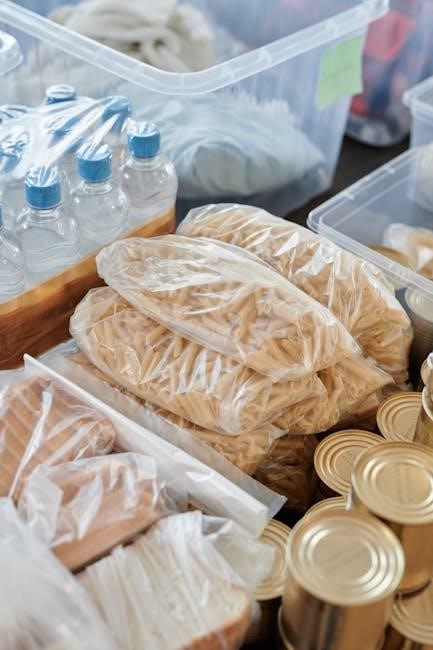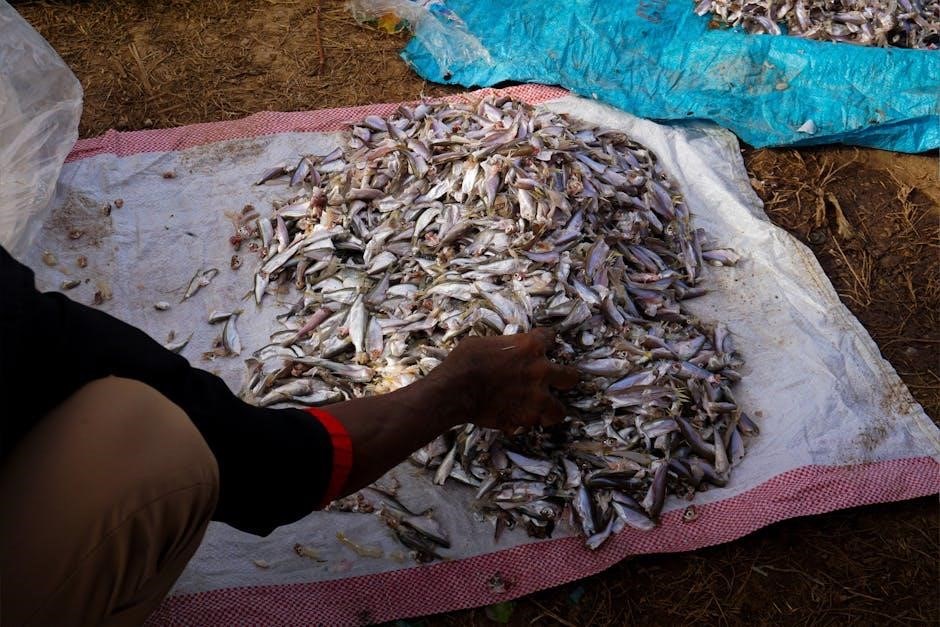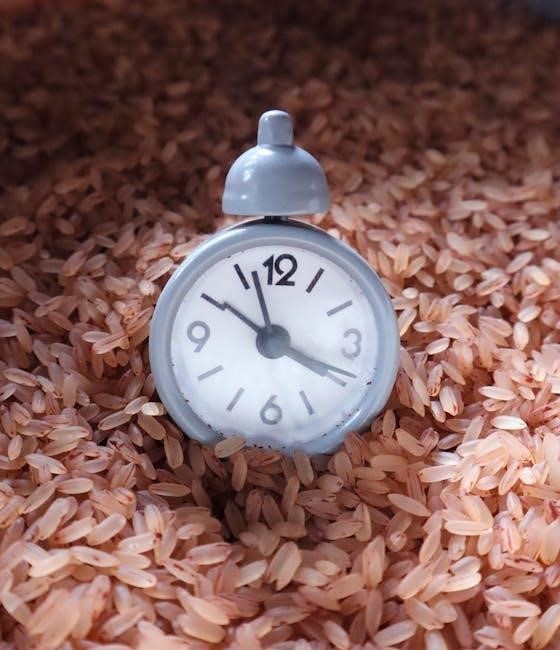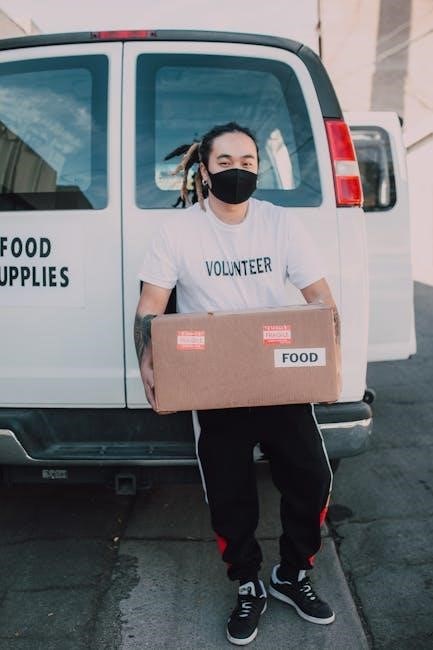The El Paso Food Bank Schedule 2023 PDF serves as a key resource for understanding distribution timelines, locations, and eligibility criteria, ensuring food security for those in need․
Overview of the El Paso Food Bank
The El Paso Food Bank, also known as El Pasoans Fighting Hunger Food Bank, is a vital organization dedicated to combating food insecurity in the El Paso region․ Established with a mission to provide nutritious food to those in need, the Food Bank has grown to serve over 185,000 low-income children across 182 schools․ It operates food pantries, mobile food units, and emergency assistance programs, ensuring access to essential resources․ The Food Bank has adapted its operations, reducing distribution days from five to four (Tuesday to Friday), to optimize efficiency․ Collaborating with local partners, it focuses on addressing hunger while fostering community engagement and education․ This institution plays a critical role in supporting vulnerable populations, making it a cornerstone of El Paso’s social services․
Importance of the 2023 Schedule PDF
The 2023 Schedule PDF is essential for individuals and families seeking food assistance in El Paso․ It provides a clear calendar of distribution days, locations, and times, enabling recipients to plan their visits effectively․ By reducing operations from five to four days a week (Tuesday to Friday), the Food Bank optimizes its resources while maintaining consistent service․ The schedule ensures transparency, helping those in need access food securely and efficiently․ It also highlights the organization’s commitment to addressing food insecurity, making it a vital tool for both recipients and volunteers․ This document aligns with the Food Bank’s mission to combat hunger and improve food accessibility in the community․
How to Access the Schedule
To access the El Paso Food Bank Schedule 2023 PDF, visit the official website of El Pasoans Fighting Hunger Food Bank․ The schedule is available for download in a user-friendly format, ensuring easy access to distribution dates, locations, and times․ Additionally, individuals can contact the Food Bank directly via phone or email to request a copy․ Local pantries and community centers may also have printed versions available․ Regularly check the Food Bank’s website for updates, as schedules may change due to operational adjustments, such as the shift from five to four distribution days per week․ This ensures you stay informed about food distribution timelines and locations, helping you plan accordingly․

Understanding the El Paso Food Bank
The El Paso Food Bank is a vital organization dedicated to combating hunger and food insecurity in the El Paso community by providing essential food distribution services to those in need․
History of the El Paso Food Bank
The El Paso Food Bank was established to address growing food insecurity in the region․ Founded with a mission to serve vulnerable populations, it has evolved into a cornerstone of community support․ Over the years, the organization has expanded its services, adapting to the changing needs of El Paso residents․ Key milestones include partnerships with local businesses and the implementation of specialized programs․ In 2023, the food bank received renewed financial support from a local refinery, enabling continued operations and service expansion․ This backing has been crucial in maintaining its commitment to providing food assistance to thousands of individuals and families in need․
Mission and Vision
The El Paso Food Bank is driven by a mission to combat hunger and food insecurity through effective distribution and education․ Its vision envisions a community where everyone has access to nutritious food, fostering health and self-sufficiency․ By collaborating with local organizations and leveraging resources, the food bank aims to create lasting impacts․ The 2023 schedule reflects this commitment, ensuring consistent support to those in need․ Through dedicated efforts, the food bank strives to not only provide immediate relief but also address root causes of hunger, aligning with its long-term vision of a food-secure El Paso․
Partnerships and Collaborations
The El Paso Food Bank collaborates with local organizations, businesses, and community groups to amplify its impact․ These partnerships enable the food bank to expand its reach and improve service delivery․ For instance, the refinery’s renewed financial support in 2023 highlights the importance of corporate involvement․ Additionally, the food bank works closely with schools, non-profits, and government agencies to ensure resources are distributed effectively․ Such collaborations also facilitate nutrition education and food sovereignty initiatives, addressing both immediate needs and long-term food security․ By uniting with diverse stakeholders, the El Paso Food Bank strengthens its ability to serve vulnerable populations and foster a healthier community․

Food Distribution Services
The El Paso Food Bank offers comprehensive food distribution services, including pantries, mobile units, and emergency aid, ensuring accessible nutrition for individuals in need across the region․
Food Pantry Locations
The El Paso Food Bank operates multiple food pantry locations throughout the city, providing convenient access to food assistance․ Key locations include the Kelly Center for Hunger Relief at 915 Florence, open Saturdays from 9 AM to 12 PM, and the Village of Vinton location at 436 Vinton Rd, serving on Fridays from 8 AM to 11 AM․ These sites are part of the food bank’s extensive network, ensuring that individuals in need can access nutritious food․ Operating hours vary by location, but most pantries are open weekdays, with some offering weekend services․ These locations play a vital role in addressing food insecurity, particularly for low-income families and vulnerable populations․
Mobile Food Pantry Schedule
The El Paso Food Bank’s mobile food pantry schedule is designed to reach underserved communities, offering fresh produce and essential groceries․ Key stops include the Kelly Center for Hunger Relief on Saturdays from 9 AM to 12 PM and the Village of Vinton location on Fridays from 8 AM to 11 AM․ These mobile units travel across El Paso, ensuring food accessibility for those with limited mobility or transportation․ The schedule is updated monthly to address evolving community needs, with additional stops added during peak demand periods․ By bringing food directly to neighborhoods, the mobile pantry bridges gaps in food distribution, helping families maintain nutrition and well-being․
Emergency Food Assistance
The El Paso Food Bank provides emergency food assistance to individuals and families in crisis, ensuring immediate access to nutritious meals․ This program operates in collaboration with local shelters, churches, and community organizations to rapidly respond to urgent needs․ Eligible recipients include those affected by natural disasters, job loss, or medical emergencies․ The food bank offers pre-packaged boxes containing non-perishable items, fresh produce, and proteins, designed to sustain families for several days․ Distribution is coordinated through designated emergency centers, with deliveries available for homebound individuals․ This vital service bridges critical gaps, providing stability during difficult times and connecting people with additional resources for long-term support․

Eligibility and Requirements
Eligibility for El Paso Food Bank assistance is based on household income, family size, and residency, ensuring support to those facing food insecurity in the community․
Who Qualifies for Assistance
Eligibility for El Paso Food Bank assistance is determined by household income, family size, and residency requirements․ Individuals and families facing food insecurity, including children, seniors, and those with disabilities, qualify․ Undocumented residents are also eligible, as the food bank serves all community members in need without restrictions․ The program aims to ensure equitable access to food resources, regardless of background or legal status, focusing on addressing hunger and improving quality of life for vulnerable populations․
Documentation Needed
Applicants for the El Paso Food Bank assistance typically need to provide proof of residency, such as a utility bill or lease agreement, and a valid government-issued ID․ Income verification, like pay stubs or a benefits award letter, may also be required to determine eligibility․ Household size documentation, such as birth certificates or Social Security cards for dependents, is often necessary․ Some programs may require additional paperwork, but the food bank strives to minimize barriers to access․ These documents help ensure resources are distributed equitably and efficiently, while also maintaining compliance with program guidelines․ The specific requirements may vary depending on the assistance program․
Frequency of Visits
The El Paso Food Bank typically allows individuals and families to visit their pantries once per month, ensuring equitable access to resources․ This frequency helps manage demand and maintain consistent food availability․ Some programs may offer more frequent visits for specific groups, such as seniors or those with urgent needs․ Emergency food assistance is generally available without visitation limits, providing immediate relief․ The schedule outlined in the 2023 PDF helps clients plan their visits effectively, balancing accessibility with resource sustainability․ By adhering to these guidelines, the food bank strives to serve the community efficiently while addressing diverse needs․

Volunteer Opportunities
Volunteering with the El Paso Food Bank offers a chance to make a difference by assisting with food distribution, organizing events, and supporting community outreach programs․
How to Become a Volunteer
Becoming a volunteer at the El Paso Food Bank is a straightforward process․ Start by visiting their official website and filling out the volunteer application form․ Once submitted, you’ll receive information about orientation sessions, which cover the food bank’s mission, safety protocols, and volunteer roles․ After completing orientation, you can schedule your volunteer time according to availability․ Volunteers are encouraged to commit to regular shifts, whether weekly, bi-weekly, or for special events․ Parking is available across the street from the warehouse or in designated volunteer parking areas․ Your contribution helps sort donations, distribute food, and support community programs, making a direct impact on food insecurity in El Paso․
Volunteer Schedule
The El Paso Food Bank operates a structured volunteer schedule to ensure efficient food distribution and community support․ Volunteers can view and sign up for available time slots through the food bank’s official website or by contacting the volunteer coordinator directly․ The schedule typically runs from Tuesday to Friday, with morning and afternoon shifts available․ Shifts generally last 3-4 hours, depending on the task․ Volunteers are encouraged to commit to regular shifts, though one-time assistance is also welcomed․ By adhering to the schedule, volunteers help maintain the food bank’s operations, ensuring food reaches those in need․ This organized approach allows the food bank to maximize its impact while providing a flexible and rewarding experience for volunteers;
Roles and Responsibilities
Volunteers at the El Paso Food Bank play a vital role in ensuring food security for the community․ Responsibilities include sorting and packaging donations, assisting with food distribution at pantries, and providing support during mobile pantry events․ Volunteers may also help with administrative tasks, such as data entry or event coordination․ Additionally, some volunteers contribute to nutrition education programs, helping clients make healthy food choices․ Others assist with community outreach, spreading awareness about food insecurity and the food bank’s services․ Volunteers are expected to maintain a respectful and professional demeanor while working with clients and staff․ By fulfilling these roles, volunteers directly impact the food bank’s ability to serve those in need, making their contributions indispensable to the organization’s mission․

Donation Guidelines
Donation Guidelines for the El Paso Food Bank include accepting non-perishable food items, organizing food drives, and monetary contributions to support operations and community programs․
Acceptable Food Items
The El Paso Food Bank accepts non-perishable food items, including canned goods, whole grains, and protein sources like beans, rice, and pasta․ Fresh produce, when available, is also welcomed․ Personal care items such as toothbrushes, toothpaste, and diapers are appreciated․ Baby formula and baby food are essential for families in need․ Monetary donations are also accepted to purchase fresh produce and other necessities․ Donors are encouraged to avoid expired or damaged items․ Food drives and community contributions play a vital role in supporting the food bank’s mission to combat hunger and food insecurity in El Paso․ Your generosity helps ensure everyone has access to nutritious meals․
Monetary Donations
Monetary donations are a crucial way to support the El Paso Food Bank, as they provide flexibility in purchasing essential items like fresh produce and proteins․ Every dollar contributes significantly to combating food insecurity․ Donations can be made online or in person and are tax-deductible, offering a beneficial option for supporters․ Funds are also used to cover operational costs, ensuring the food bank can continue its mission․ By contributing financially, individuals and organizations help the food bank serve over 185,000 low-income children and families across 182 schools and multiple pantries․ Your monetary support directly impacts the community, enabling the food bank to address hunger and improve food access in El Paso and surrounding areas․
Organizing Food Drives
Organizing food drives is a meaningful way to support the El Paso Food Bank and help address food insecurity in the community․ These drives collect non-perishable items, fresh produce, and other essentials to stock pantries and distribution centers․ Individuals, schools, businesses, and organizations can initiate a drive by registering with the food bank, setting a timeline, and promoting the event․ Key items to collect include canned goods, whole grains, and hygiene products․ Volunteers can help sort and distribute the donations․ Food drives not only provide critical resources but also raise awareness about hunger issues․ By coordinating with the food bank, organizers ensure their efforts align with current needs, maximizing the impact of their contributions to those in need in El Paso․
Special Programs
El Paso Food Bank offers special programs focused on nutrition education, food sovereignty, and community outreach, empowering individuals and fostering sustainable food access for those in need․
Nutrition Education
The El Paso Food Bank offers nutrition education programs aimed at promoting healthy eating habits and food preparation skills among families in need․ These programs include workshops, cooking classes, and educational resources to help individuals make informed food choices․ Topics covered range from meal planning on a budget to understanding proper food safety practices․ By empowering individuals with knowledge, the food bank supports long-term health and self-sufficiency in the community․ Additionally, the program distributes educational materials in multiple languages to ensure accessibility for all participants․ This initiative not only addresses immediate food insecurity but also fosters healthier lifestyles, contributing to overall well-being and reducing the risk of diet-related illnesses․
Food Sovereignty Initiatives
The El Paso Food Bank supports food sovereignty initiatives to empower communities in achieving food self-determination․ These programs focus on reconnecting people with their cultural food traditions and promoting locally grown, sustainable food systems․ By partnering with local farmers and community gardens, the food bank helps increase access to fresh, nutritious produce․ Food sovereignty initiatives also include educational workshops on urban agriculture, food preservation, and cooking traditional meals․ This approach not only addresses food insecurity but also fosters cultural pride and environmental stewardship․ The goal is to create a resilient food system where communities have control over their food sources, ensuring long-term food security and sustainability․ These efforts align with the food bank’s mission to combat hunger while promoting healthier, more equitable food systems․
Community Outreach
Community outreach is a vital component of the El Paso Food Bank’s mission to combat hunger and improve food security․ Through mobile food pantries and partnerships with local organizations, the food bank reaches underserved populations across the region․ Outreach events, including food distributions and health fairs, are organized to connect individuals with essential resources․ The food bank collaborates with schools, churches, and nonprofits to ensure access to food assistance․ These efforts focus on vulnerable groups, such as children, seniors, and families in need․ By engaging the community and raising awareness about food insecurity, the food bank fosters a collective commitment to addressing hunger․ Outreach programs also provide education on nutrition and available food assistance options, further enhancing their impact on food security and community well-being․

Challenges and Solutions
The El Paso Food Bank faces challenges like food insecurity and logistical hurdles but implements innovative solutions, such as mobile pantries and partnerships, to effectively serve the community․
Food Insecurity in El Paso
Food insecurity remains a pressing issue in El Paso, with many low-income families struggling to access nutritious meals․ The El Paso Food Bank plays a crucial role in addressing this challenge by distributing millions of pounds of food annually․ Despite these efforts, factors like poverty, unemployment, and limited resources continue to exacerbate food insecurity, particularly in rural and underserved areas․ Vulnerable populations, including children and the elderly, are disproportionately affected․ The food bank collaborates with local organizations to expand its reach and ensure equitable access to food․ By providing consistent support, the El Paso Food Bank helps alleviate hunger and promotes food security for those in need, making a significant impact on the community’s well-being․
Logistical Challenges
The El Paso Food Bank faces logistical challenges in ensuring efficient food distribution across its vast service area․ Transportation limitations, particularly in rural regions, hinder timely delivery to remote communities․ Additionally, supply chain disruptions and storage capacity issues impact the ability to maintain consistent food availability․ The food bank must also manage volunteer coordination, as fluctuating volunteer numbers can affect distribution efficiency․ Despite these obstacles, the organization continues to adapt by optimizing routes and enhancing partnerships to overcome logistical hurdles and maintain its critical services to those in need․
Innovative Solutions
The El Paso Food Bank has implemented innovative solutions to address logistical challenges and enhance service delivery․ Mobile food pantries have been introduced to reach remote areas, ensuring food accessibility for underserved communities․ Additionally, the food bank leverages technology to optimize distribution routes and manage inventory efficiently․ Partnerships with local organizations and businesses have also been strengthened to increase food donations and volunteer support; Community outreach programs, including nutrition education, further empower residents to make healthy food choices․ These strategies not only improve the food bank’s operational efficiency but also expand its reach, ensuring more individuals receive the assistance they need in a timely and effective manner․
The El Paso Food Bank continues to adapt its services, ensuring food security and addressing community needs effectively through its 2023 schedule and innovative initiatives․
Impact of the El Paso Food Bank
The El Paso Food Bank has significantly reduced food insecurity by serving over 185,000 low-income children across 182 schools․ Its food pantries and mobile distributions provide essential meals, empowering families and fostering community resilience․ By addressing hunger, the food bank enables individuals to focus on education, health, and economic stability․ Its nutrition education and food sovereignty programs further enhance food security, promoting self-sufficiency and cultural connections to food․ The food bank’s efforts have created a ripple effect, improving overall well-being and strengthening the community’s ability to thrive․ Their commitment to innovation and collaboration ensures sustained support for those in need․
Future Goals and Plans
The El Paso Food Bank aims to expand its services and infrastructure to reach more individuals in need․ Plans include enhancing nutrition education programs, increasing food distribution capacity, and strengthening community partnerships․ The food bank also intends to explore innovative solutions to reduce food insecurity, such as implementing new technologies for food recovery and distribution․ Additionally, there is a focus on improving emergency food assistance programs to ensure rapid response during crises․ By mobilizing more volunteers and resources, the food bank strives to address the growing demand for food aid․ These efforts will help create a more sustainable and resilient food system for El Paso, ensuring long-term support for vulnerable populations․
Call to Action
Join the El Paso Food Bank in making a difference by volunteering, donating, or spreading awareness about food insecurity․ Check the 2023 schedule to find distribution locations and times․ Your support can help provide meals to thousands in need․ Consider organizing a food drive or contributing financially to expand their reach․ Together, we can build a stronger, hunger-free community․ Visit their website or contact them directly to learn more about how you can assist․ Every action counts in the fight against hunger!

